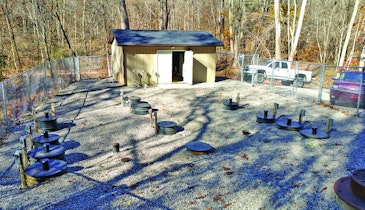
Interested in Education/Training?
Get Education/Training articles, news and videos right in your inbox! Sign up now.
Education/Training + Get AlertsRobb Barnes, owner of King’s Pumping Service in Dallas, Oregon, was a teacher (biology and health) and customer service manager before entering the liquid waste industry. Despite economic ups and downs, Barnes, 58, has managed to grow his business every year. In 2015, sales were up 14 percent.
He has two full-time employees and believes in customer education and providing quality, on-time service. A guest presenter at WWETT 2016, Barnes will discuss Growing Your Business in a Tough Economy on Thursday, Feb. 18, from 9:30 to 10:30 a.m. in rooms 136-138.
Q: Robb, what’s been the secret to your success?
A: If you educate people, and you get them to understand the economics of maintaining a septic system and if you learn to step outside the “I drive a pump truck" box, there’s no limit to how far you can grow your business.
Q: How have you been able to put that into practice?
A: We don’t reinvent the wheel. There’s a ton of material out there on the educated customer, how to maintain systems and the benefit of it. We go over that with every customer. We give customers a packet that explains the parts of a septic system, how a septic system works and a recommended pumping frequency chart from the Oregon State University Extension Service. They also receive a reminder card when it’s time to have their septic systems pumped.
Q: During your presentation you say there are two things every business can do to increase sales. What are they?
A: People have to be articulate and explain in layman’s terms the cost-benefit of maintaining a system. The second thing is the reminder card system. Every month we send out 50 to 100 reminder cards to people who are due to pump their tank. We have about a 30 percent response rate within the first 30 days and about a 50 to 60 percent response rate within 90 days. That’s existing business we don’t have to spend seven times the dollars to go get.
Q: How else can you maximize your customer base?
A: By using a good recordkeeping system, we know how long it takes to do jobs. We can schedule more efficiently. We’ve been late less than a half-dozen times in 19 years. We don’t schedule a two-hour window. We tell customers when we will be there, and if we’re more than five minutes late, they get a phone call.
Q: Would you say customer service is what differentiates your business from others?
A: Customers all have a choice in whom they can call. Every tank should be cleaned the same way – it should be clean down to the bottom. It’s the part beyond that that differentiates you.
We take good care of our customer list, take good notes and keep good records. We know if there’s a steep driveway and how many feet of hose it’s going to take. We know it’s going to take two guys to lift the lid. We know the dog’s name. If there’s a kid running around asking questions, we put his name down. “Hey, Tony ought to be about 8 now. He should be in third grade. How’s he doing?” Customers think it’s amazing. Every job has a copy of those notes that goes out with the work order.
Q: How has customer education made life easier for you?
A: If you maintain your septic system it obviously lasts longer. As a result, we don’t get many emergency calls. We don’t have after-hour calls.
Q: What is the greatest challenge to growing a business in a tough economy?
A: Mindset. So many people are locked into the way stuff has been done. I’ve taught classes for our state conference on the reminder card system and education packet and somebody will say, “I don’t have time for that.” You know, you don’t have time not to do it. It’s tough to get people to change their mindset. I’m not the sharpest tool in the shed, but if we can grow our business every year to where our sales volume is six times larger than what it was with the same number of employees, it wasn’t because I was working harder, I was just trying to be smarter.
Q: How can a business owner work smarter, not harder?
A: It all comes back to customer service. It costs seven times as much to get a new customer than it does to keep an existing one. The number of small-business owners who lose customers each year because of poor customer service is appalling. There’s no reason for it. If I can get a 30 percent response rate in 30 days on a 25-cent reminder card with a 32-cent stamp, I don’t have to go find that new customer. I don’t have to spend money on advertising. I’ve got word-of-mouth. People need to take care of their customers.
Q: What can WWETT attendees expect to learn from your presentation?
A: We’re going to go over five ways to enhance the two assets that every business has – your reputation and your customer list. There’s image, being articulate, being pleasant, being on time and being able to think outside the box. If you focus on those five areas, you will grow your business.





